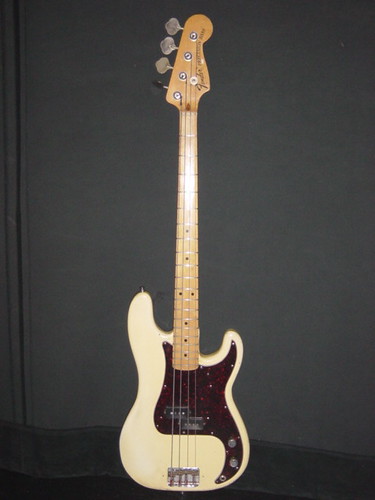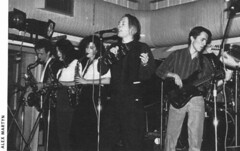
Colin’s favorite bass
“If you’re working on a computer and you’re editing bass, it looks like a warm curvy, sort of feminine object. The actual shape of the sound conforms to what you’re listening to. It’s like a big padded fluffy duvet and I like that.”
Finally, it should go without saying that if you have plans to be just like Colin you had better get cracking and learn to play an instrument or two.
It does beat working.
Colin started with classical guitar at fifteen at the Abingdon School, where he studied with influential teacher Terence Gilmore-James, who introduced Colin and the other boys destined to be in Radiohead to jazz, film scores, post WWII era avant-garde music, and twentieth century classical music.
[Gilmore-James:] “I watch over Radiohead much as I watch over my children,” he said in a phone call. He spoke with the fastidiousness of a lifelong teacher, and yet his tone was enthusiastic rather than dogmatic. “They were all of them talented boys, in the sense that they had more than average abilities to think for themselves. I was of a different generation, and I did not always grasp what they were after, but I knew that they were serious. And they were delightful to be around, always getting carried away by their latest discoveries. Whenever I see them” — his voice became firm — “I tell them that they must continue to pursue their own original line.”

Colin playing with an early incarnation of Radiohead
Eventually, wanting to be in a band, Colin picked up a bass guitar, teaching himself by playing along to New Order, Joy Division and Otis Redding.
I’m really more of a soulboy. Bill Withers and Curtis Mayfield, those are the people who informed me in playing the bass. That combination of rhythm and melody.Colin also plays a variety of additional instruments including upright bass, bowed double bass and keyboards; more recently he took up classical piano lessons.
“We were people who picked up their respective instruments because we wanted to play music together, rather than just because we wanted to play that particular instrument. So it was more of a collective angle, and if you could contribute by having someone else play your instrument, then that was really cool. I don’t think of myself as a bass player anyway. I’m just in a band with other people. I also think it’s a good start to be playing in a band with people who are friends.”
As one half of Radiohead’s phenomenal, trance-inducing rhythm section — the backbone of the group — Colin’s bass playing has been called many things by reviewers. Monumental; snarling; jumpy; funky; asthmatic; plaster-busting; tectonic; melodic; stellar; rolling; thundering; groovy; saucy; and messianic.
In August 2005 there was a post from Thom Yorke on Dead Air Space describing Colin’s sound:
colins i s playing sleaz bass on mornin’ mi lord.. its sounds very heavy. err phat. ..like a freight train... ‘the speakers ar e cracking’ thom

Colin on stage, June 2006
Originally uploaded by bonobaltimore.
But, novice bass players, don’t give up hope. Take this comment from Radiohead engineer Nigel Godrich to heart:
“All the bands Radiohead liked when they were kids were like Joy Division, and people who couldn’t necessarily play their instruments very well. I’ve learned that you don’t have to be a good player to be a musical person, and some of the most musical people I know have been crap at their instruments, but they’ve always produced something really good. Then you have someone who’s a shit-hot session musician but is soulless and boring to listen to.”
A last word from Colin on the subject:
“Try and find some talented people you get on with and learn to enjoy spending hours rehearsing in village halls around [town] instead of having a social life. It worked for us!”
RESOURCES FOR THE COLIN WANNA-BE
- On the Road with Graham — insight into life on the road
- BassMasta Radiohead tabs
